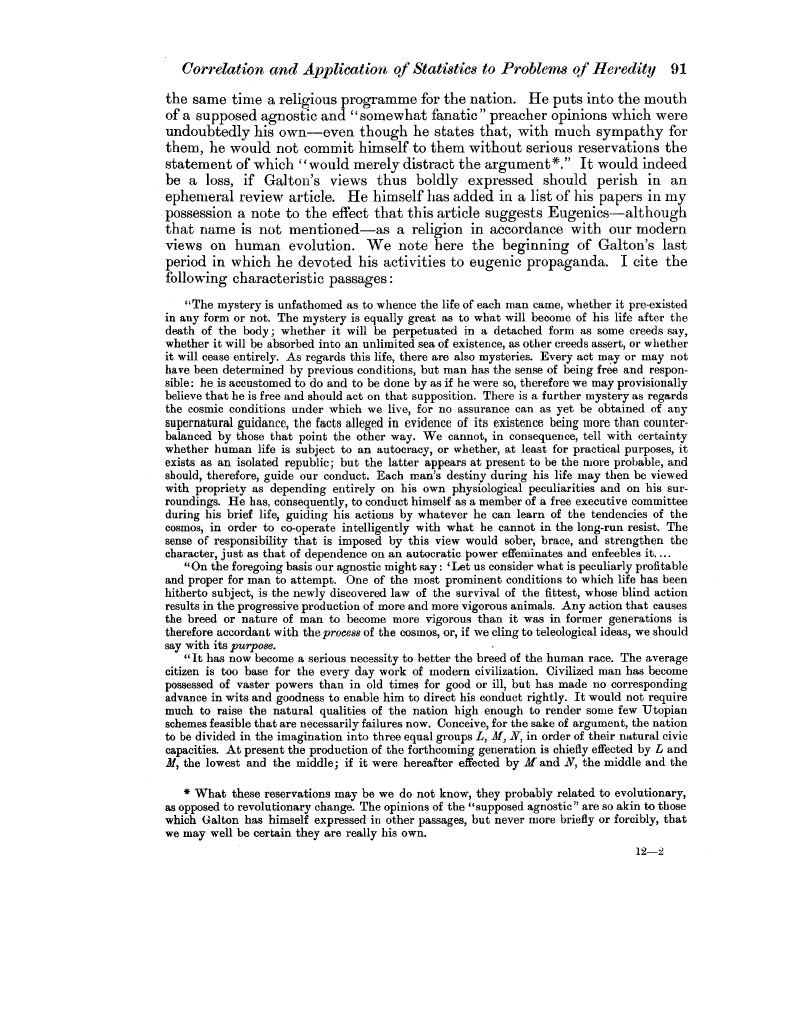| ||||||

OCR Rendition - approximate
Correlation and Application of Statistics to Problems of Heredity 91 the same time a religious programme fbr the nation. He puts into the mouth of a supposed agnostic and "somewhat fanatic" preacher opinions which were undoubtedly his own-even though he states that, with much sympathy for them, he would not commit himself to them without serious reservations the statement of which "would merely distract the argument*." It would indeed be a loss, if Galton's views thus boldly expressed should perish in an ephemeral review article. He himself has added in a list of his papers in my possession a note to the effect that this article suggests Eugenics-although that name is not mentioned-as a religion in accordance with our modern views on human evolution. We note here the beginning of Galton's last period in which he devoted his activities to eugenic propaganda. I cite the following characteristic passages "The mystery is unfathomed as to whence the life of each man came, whether it pre-existed in any form or not. The mystery is equally great as to what will become of his life after the death of the body; whether it will be perpetuated in a detached form as some creeds say, whether it will be absorbed into an unlimited sea of existence, as other creeds assert, or whether it will cease entirely. As regards this life, there are also mysteries. Every act may or may not have been determined by previous conditions, but man has the sense of being free and responsible: he is accustomed to do and to be done by as if he were so, therefore we may provisionally believe that he is free and should act on that supposition. There is a further mystery as regards the cosmic conditions under which we live, for no assurance can as yet be obtained of any supernatural guidance, the facts alleged in evidence of its existence being more than counterbalanced by those that point the other way. We cannot, in consequence, tell with certainty whether human life is subject to an autocracy, or whether, at least for practical purposes, it exists as an isolated republic; but the latter appears at present to be the more probable, and should, therefore, guide our conduct. Each man's destiny during his life may then be viewed with propriety as depending entirely on his own physiological peculiarities and on his surroundings. He has, consequently, to conduct himself as a member of a free executive committee during his brief life, guiding his actions by whatever he can learn of the tendencies of the cosmos, in order to co-operate intelligently with what he cannot in the long-run resist. The sense of responsibility that is imposed by this view would sober, brace, and strengthen the character, just as that of dependence on an autocratic power effeminates and enfeebles it.... "On the foregoing basis our agnostic might say : `Let us consider what is peculiarly profitable and proper for man to attempt. One of the most prominent conditions to which life has been hitherto subject, is the newly discovered law of the survival of the fittest, whose blind action results in the progressive production of more and more vigorous animals. Any action that causes the breed or nature of man to become more vigorous than it was in former generations is therefore accordant with the process of the cosmos, or, if we cling to teleological ideas, we should say with its purpose. "It has now become a serious necessity to better the breed of the human race. The average citizen is too base for the every day work of modern civilization. Civilized man has become possessed of vaster powers than in old times for good or ill, but has made no corresponding advance in wits and goodness to enable him to direct his conduct rightly. It would not require much to raise the natural qualities of the nation high enough to render some few Utopian schemes feasible that are necessarily failures now. Conceive, for the sake of argument, the nation to be divided in the imagination into three equal groups L, M, N, in order of their natural civic capacities. At present the production of the forthcoming generation is chiefly effected by L and M, the lowest and the middle; if it were hereafter effected by Hand N, the middle and the * What these reservations may be we do not know, they probably related to evolutionary, as opposed to revolutionary change. The opinions of the "supposed agnostic" are so akin to those which Galton has himself expressed in other passages, but never more briefly or forcibly, that we may well be certain they are really his own. 12-2
|